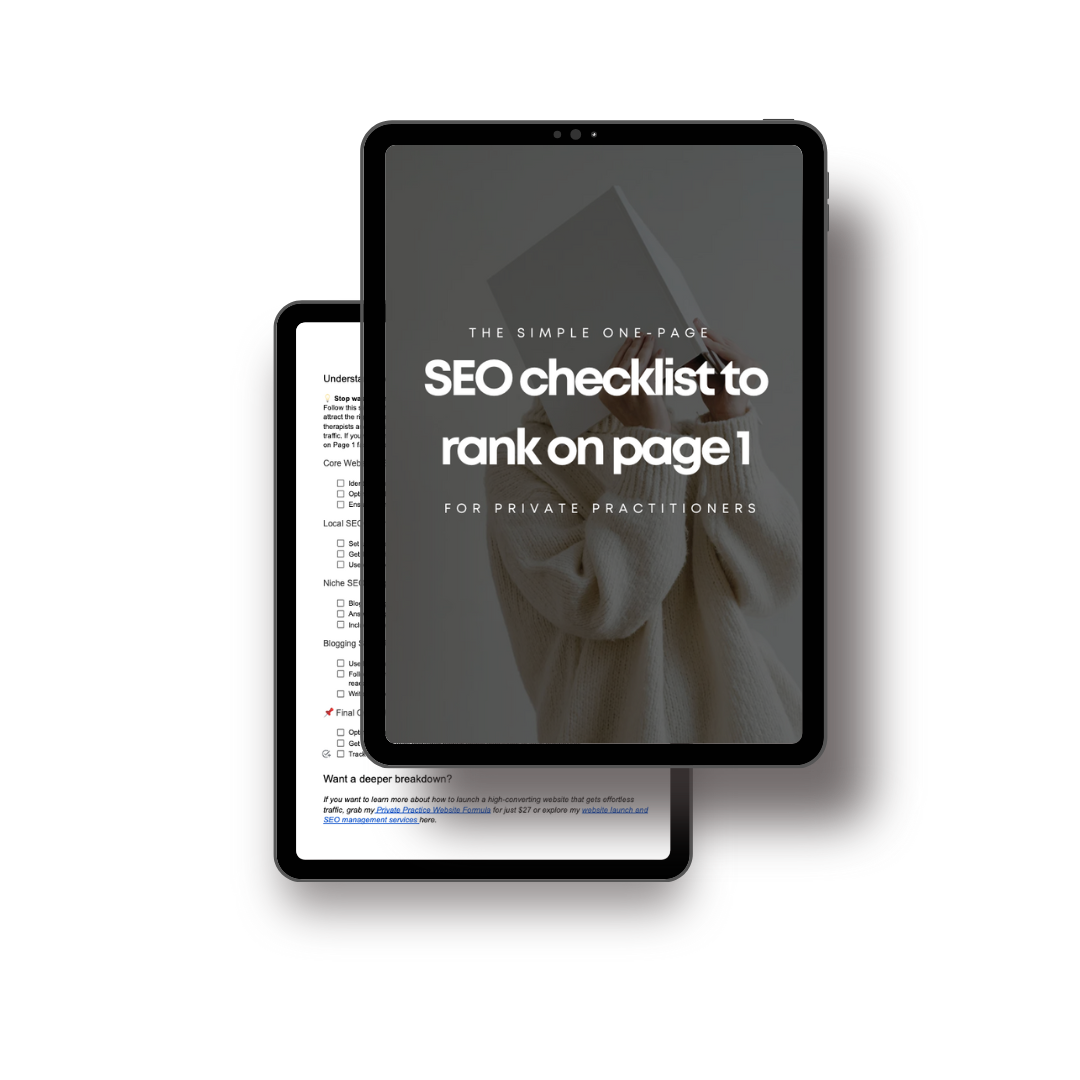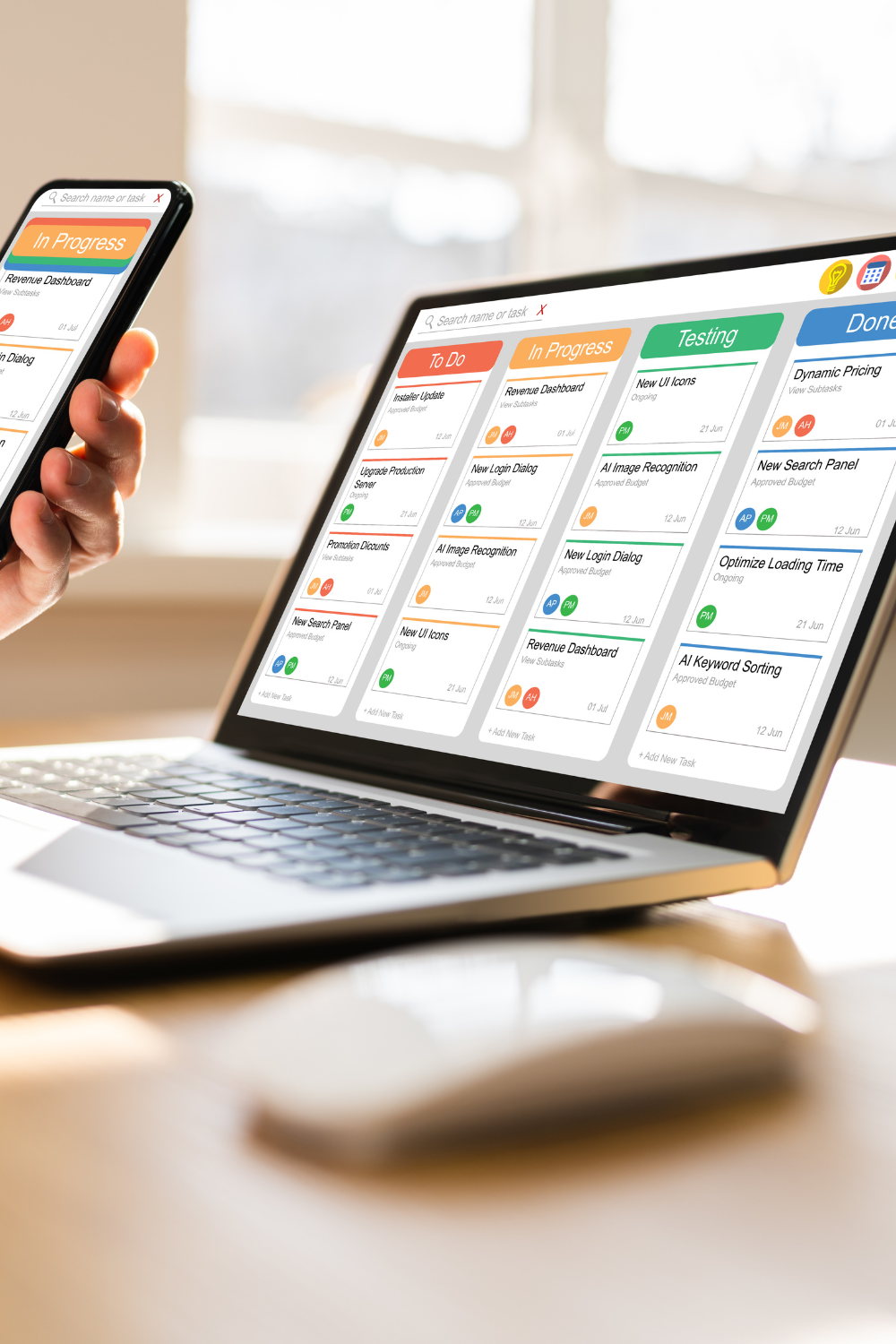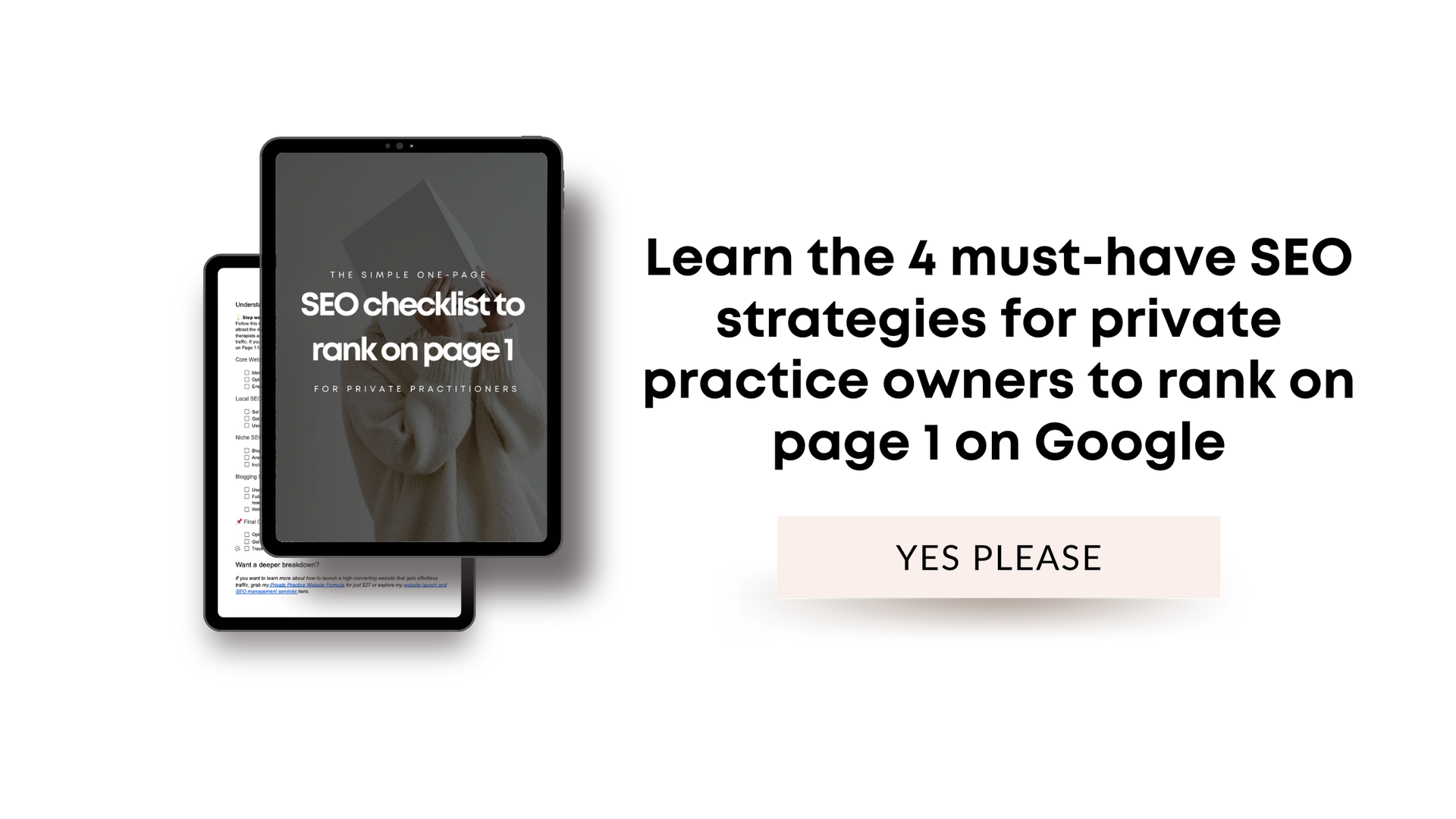How to choose the best practice management software for your private practice
You built your private practice to make a difference, not to get buried in paperwork. Yet, between scheduling clients, organizing records, and dealing with insurance claims, the administrative load can feel overwhelming. Like many therapists and wellness professionals, you’re likely searching for a way to focus more on your clients and less on the behind-the-scenes business tasks.
The good news? Practice management software can help streamline your workflow, giving you back the time to focus on what truly matters—your clients. The challenge? Choosing the right one. With so many options available, how do you determine which software will actually support your practice instead of adding complexity?
In case you’re new here, I’m Natalia, a website designer for therapists. I help private practice owners simplify their marketing, streamline workflows, and grow their businesses through strategic web design and seo content.
What is practice management software?
Imagine waking up knowing that your day is fully scheduled, your client records are organized, and your invoices are automatically processed. That’s the power of a PMS.
Practice management software is a digital system designed to streamline administrative tasks for healthcare professionals. Instead of juggling spreadsheets, emails, and paper files, therapists can manage everything from one intuitive platform.
Here’s how PMS helps transform your practice:
Appointment scheduling: never double-book again
When you use a PMS with automated scheduling, your system starts handling reminders, syncing with your calendar, and even allowing clients to book themselves online—cutting admin time in half.
Billing & insurance processing: no more late payments
PMS platforms automate invoicing, process insurance claims directly, and even send payment reminders so therapists can get paid on time without the awkward money conversations.
Client documentation & SOAP notes: say goodbye to paper clutter
Imagine sitting down at the end of your workday, exhausted, and realizing you still have six client notes to write. A PMS lets you create templates, autofill repetitive fields, and organize all documentation securely in one place. Now, instead of spending an hour catching up on notes, therapists can finish documentation in minutes.
Telehealth integration: secure, simple virtual sessions
For therapists running virtual sessions, integrating telehealth into their PMS makes life much easier. Instead of using multiple platforms for video calls, scheduling, and notes, everything is built into one system—HIPAA-compliant and seamless for both therapist and client.
Document sharing: no more printing & scanning forms
Remember when new clients had to print, sign, and scan intake forms? With a PMS, clients can complete forms online before their session, ensuring you have everything you need ahead of time.
Referral tracking: strengthen your professional network
If you collaborate with other providers, a PMS makes it easy to track referrals, keep records of shared clients, and ensure that no information gets lost along the way.
Automated workflows: more time, less hassle
Instead of manually sending appointment confirmations, follow-up emails, or intake reminders, a PMS automates these tasks so you can focus on your clients—not your inbox.
Common hesitations when choosing a PMS
It’s natural to feel hesitant before investing in a new system. Here are three common concerns—and why they shouldn’t hold you back.
1. “Will it be too complicated?”
Many PMS platforms offer free trials and customer support to help therapists get started. Once you set up automation and templates, it actually simplifies your workflow—saving time instead of adding more work.
2. “Do I really need it?”
Ask yourself this: How much time are you spending on admin work each week? If it’s more than three hours, a PMS can help you reclaim that time and reduce stress.
Best practice management software for private practices
Here are some of the top PMS options, their standout features, and who they’re best suited for:
1. Simple Practice
Best for: Solo practitioners who need an all-in-one solution.
Features: Client scheduling, billing, SOAP notes, and telehealth.
Why it’s popular: Easy to use, affordable, and integrates seamlessly with private practices. Therapists who want a streamlined, ready-to-go platform often prefer Simple Practice.
2. Jane
Best for: Holistic and wellness-focused private practices that want a beautiful, user-friendly platform.
Features: Online booking, charting, insurance billing, telehealth, and customizable intake forms.
Why therapists love it: Jane is known for its intuitive design, warm aesthetic, and thoughtful customer service. It’s ideal for therapists, chiropractors, and integrative health professionals who want to offer a seamless client experience without sacrificing back-end functionality.
3. AdvancedMD
Best for: Larger practices with complex billing needs.
Features: AI-powered automation, insurance tracking, and customizable templates.
Why it’s great: Scalable with advanced automation options. If you’re expanding or managing multiple practitioners, AdvancedMD can help streamline operations and maximize efficiency.
4. eClinicalWorks
Best for: Clinics needing full medical records management.
Features: Cloud-based patient records, voice recognition, and e-prescriptions.
Why it stands out: Combines electronic health records (EHR) with practice management. For therapists working alongside medical professionals, this software ensures compliance and coordination of care.
5. CareCloud
Best for: Growing practices focused on analytics and automation.
Features: Revenue cycle management, patient engagement tools, and financial tracking.
Why it’s beneficial: If you want deep insights into your practice’s performance and automated financial management, CareCloud provides powerful tools for scaling efficiently.
6. McKesson
Best for: Medical and multidisciplinary clinics needing top security.
Features: Electronic claims processing, inventory tracking, and secure data storage.
Why therapists choose it: McKesson offers robust security features, making it ideal for high-volume practices that prioritize compliance and data protection.
By selecting the right PMS, you can take control of your practice’s administrative side and focus on what truly matters—helping your clients.
What is the difference between a CRM and a PMS?
Many people confuse practice management software with customer relationship management (CRM) tools. Here’s how they differ:
| Feature | CRM | PMS |
|---|---|---|
| Purpose | Focuses on client engagement & marketing | Manages administrative & operational tasks |
| Best for | Increasing visibility & client retention | Handling scheduling, billing, and compliance |
| Key features | Email marketing, lead tracking | Billing, client notes, appointment scheduling |
For more details, check out my guide to the best CRM for therapists.
How your website can work with your PMS
A well-built website should work with your practice management software. Your website should attract and convert potential customers and nurture them through email marketing while after they become clients you manage their information and case in your practice management software.
Managing a private practice is about helping people, not drowning in paperwork. The right PMS, paired with a strategic website, ensures that your operations run smoothly so you can focus on what truly matters—your clients.
Ready to build a high-converting website that simplifies your workflow?
Let’s create a site that supports your growth. Explore my web design services for therapists here.
Related reads
- Should you have your website in Simple Practice? Pros, cons, and website examples
- The Best Healthcare Work-From-Home Jobs vs. Private Practice
- How my clients recover from therapist burnout with this simple strategy
- The best therapist website template structure I recommend to all my clients
- The stress-free guide to becoming an entrepreneur in healthcare
- How to write a thoughtful therapy termination letter

* AI Disclosure: This content may contain sections generated with AI with the purpose of providing you with condensed helpful and relevant content, however all personal opinions are 100% human made as well as the blog post structure, outline and key takeaways.
* Affiliate Disclosure: Some of the links on www.nataliamaganda.com may contain affiliate links meaning that I will get a commission for recommending products at no extra cost to you.

hello! i'm natalia
Latina, web design expert for mental health professionals.
I help ambitious life coaches, therapists and holistic leaders amplify their magic, gain visibility, and simplify their marketing efforts through strategic web design and content.










